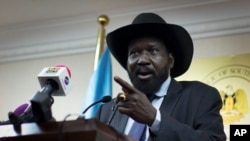South Sudanese President Salva Kiir and scores of other African leaders are in the U.S. capital for the first-ever U.S.-Africa leaders summit that begins Monday.
But just days before he was due to travel to Washington for the summit, Mr Kiir made some scathing remarks about the West, accusing countries that are seen as having played essential roles in South Sudan’s birth in 2011 – including the United States – of seeking to grab the young country’s oil.
“When they went into Iraq, what happened? And when they went into Libya, what happened? Now, Syria is going down in flames. We need to sit and have a dialogue instead of using force,” Mr Kiir said in the speech on Wednesday to commemorate the millions who died fighting for South Sudan’s independence.
Then, the president of South Sudan said, “What they covet is our resources, it’s this rich land of ours.”
South Sudan’s key, and at this point only, resource is oil. Almost all government revenues come from oil.
But South Sudanese oil production has been hard hit by more than seven months of fighting in the country, which has been concentrated in the two oil-producing states, Unity and Upper Niles, as well as Jonglei state, in between them.
What they covet is our resources, it’s this rich land of ours.South Sudan President Salva Kiir
Luke Patey, a senior researcher at the Danish Institute for International Studies and author of “The New Kings of Crude,” which is about South Sudan’s oil, said Mr. Kiir’s accusations were wrong-footed.
Even at the pre-conflict production level of around 300,000 barrels per day, South Sudan’s oil production is only a drop in the global oil bucket -- 0.3 percent of worldwide production, Patey told South Sudan in Focus.
“This isn’t an Iraq, this isn’t Saudi Arabia. This is really a small player in the international oil industry, and at the moment there are no U.S. interests in that oil,” Patey said.
Awan Guol, a Minister in the Office of the President, said Mr. Kiir's anti-Western statement were a slip of the tongue.
"The government is being pushed to the wall, and things slide out. It may bring some consequences that nobody likes," he said.
But a country's natural resources, Guol added, are part of the "internal affairs of a country" and "must be respected."
This isn’t an Iraq, this isn’t Saudi Arabia. This is really a small player in the international oil industry.Luke Patey, author and researcher
South Sudan has been looking to diversify its economy away from oil by exploiting its reserves of gold, but the foreign investors required to do that have held off because of the conflict.
Western input could stabilize oil decline
Instead of attacking Western companies and questioning their intentions in South Sudan, Mr Kiir should be wooing them, Patey said.
“American and European firms, particularly specialized oil service companies, can actually help to stabilize South Sudan’s decline in production,” he said.
Mr. Kiir’s condemnation of alleged outside interference in South Sudan’s affairs, and his accusation that the West is after South Sudan’s resources could be an attempt to shift the focus away from the dire situation on the ground in South Sudan, Patey said.
“It may be a sign of an increasingly desperate president who’s looking for scapegoats to explain the chaos and destruction that he and rebel leader Riek Machar have unleashed on the people of South Sudan,” he said.
“Let’s hope with upcoming peace talks -- if they occur -- and with the U.S.-Africa Leaders summit that South Sudan and the U.S. can patch up deteriorating relations and work together towards ending the civil war.”
Talks led by East African regional bloc, the Intergovernmental Authority on Development (IGAD), to end more than seven months of fighting in South Sudan were supposed to get back up and running on Wednesday.
They are now due to resume in Addis Ababa on Monday -- just as the U.S.-Africa Leaders summit gets under way in Washington.
"Remarkable' US-South Sudan relations
Guol said relations between Juba and Washington have been "remarkable since the days of the struggle," the term used by many South Sudanese for the long fight for independence from Sudan.
"However, the incident of December 15" -- when fighting broke out in Juba before spreading to other parts of South Sudan -- "put us back," Guol said.
"We believe that the efforts of the U.S. and other friendly countries who supported us in our struggle for independence – we feel we let them down," he said.





